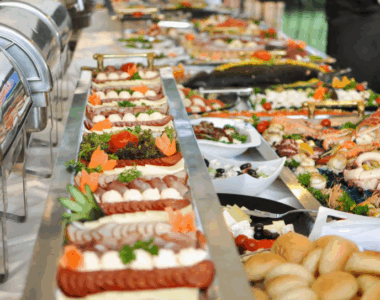Key Highlights
- Experience a Cultural Harmony: Chinese Muslim weddings blend Islamic principles with rich Chinese heritage—creating unique, love-filled celebrations.
- Honor Timeless Traditions: Understand the role of the Nikah and Chinese tea ceremony—symbols of grace, unity, and family honor.
- Plan with Cultural Insight: Learn the value of pre-wedding rituals like selecting an auspicious date via the Chinese lunar calendar.
- Celebrate Interfaith Respect: Discover how Arabic and Chinese elements coexist beautifully in these fusion weddings.
- Collaborate with Community: Families and mosques join forces to uphold Halal standards and cultural traditions.
- Simplify Wedding Planning: Use Shabaaz.com to turn your multicultural wedding vision into reality, seamlessly.
Introduction
Chinese Muslim weddings are where tradition, love, and faith meet. At Shabaaz.com, we help couples navigate this beautiful cultural fusion—where Islam meets Chinese heritage. Imagine a wedding where Arabic prayers echo through a Chinese tea ceremony, and family bonds are celebrated alongside religious commitment. For couples seeking to honor both backgrounds, our tools and vendors make it easy to craft a ceremony that’s meaningful, inclusive, and unforgettable.
Embracing Cultural Fusion: What Makes Chinese Muslim Weddings Unique

Chinese Muslim weddings showcase a balanced blend of religious sincerity and cultural celebration. They highlight how two traditions—Islamic and Chinese—can honor each other. From Halal meals to calendar-driven event planning, these weddings symbolize mutual respect.
Shabaaz.com helps couples coordinate every aspect: from locating mosques for the Nikah to finding decorators familiar with Chinese motifs. This ensures every detail reflects your shared heritage.
Fusion Traditions: A Celebration of Unity

At the heart of these weddings is the beauty of cultural diversity. Arabic nasheeds often play alongside traditional Chinese instruments. These musical choices mirror the ceremony itself—sacred and joyful, familiar yet refreshingly unique.
Ceremonies like the tea ritual represent deference to elders, while the Nikah seals the union in faith. With Shabaaz.com, couples can find knowledgeable officiants, event planners, and cultural consultants who understand how to bring both worlds together respectfully.
Key Elements of a Chinese Muslim Wedding
A traditional Chinese Muslim wedding combines spiritual rituals with vibrant symbolism. Essential moments include:
- Nikah Ceremony: The formal Islamic union, usually held in a mosque or at home.
- Chinese Tea Ceremony: A gesture of respect toward elders, blending seamlessly with Islamic values.
- Fusion Fashion: Brides and grooms often wear outfits inspired by Malay, Chinese, and Islamic traditions—available from curated designers on Shabaaz.com.
- Symbolic Decor: Flower petals, lucky coins, and Arabic calligraphy bring cultural depth.
With the right vendors from Shabaaz.com, couples can ensure their event remains elegant, Halal, and beautifully blended.
Pre-Wedding Rituals: Building the Foundation

Planning starts early, with family meetings and logistical steps that reflect both cultures. The mosque is booked, menus are reviewed for Halal compliance, and key elders are consulted.
Using the Chinese lunar calendar to select a wedding date adds a spiritual layer, honoring ancestral traditions. With Shabaaz.com’s planning tools, couples can coordinate guest lists, book culturally aware caterers, and personalize invitations with bilingual text.
Consulting the Chinese Lunar Calendar

Choosing a lucky date isn’t just a tradition—it’s a statement of cultural identity. By syncing Islamic prayer times with favorable lunar days, couples honor both spiritual and cultural roots.
Shabaaz.com helps simplify this process with calendar tools and expert insights. From date selection to venue availability, we guide you step-by-step so everything aligns perfectly.
Family’s Role in the Celebration

Chinese Muslim weddings aren’t just about two people—they’re about two families. Parents guide key decisions, from mosque visits to tea ceremony protocols.
Shabaaz.com makes collaboration easier by providing shared planning dashboards, family RSVP tools, and cultural guides. This makes the wedding a joyful union of generations, not just individuals.
Conclusion: Plan Your Culturally Rich Wedding with Confidence
A Chinese Muslim wedding is more than an event—it’s a meaningful fusion of history, culture, and faith. Whether you’re managing family expectations, organizing rituals, or finding the perfect blend of Arabic and Chinese decor, Shabaaz.com is your one-stop partner.
From Nikah to tea ceremony, from Halal catering to personalized invites, we help you bring your dream celebration to life—with respect, elegance, and ease.
Ready to start planning your perfect multicultural wedding? Visit Shabaaz.com today and connect with vendors who understand both your faith and your culture.
Frequently Asked Questions
What are the common customs in a Chinese Muslim wedding in Singapore?
Couples blend Islamic traditions like the Nikah with Chinese customs like the tea ceremony. Bright, culturally meaningful attire and Halal food are standard. Shabaaz.com connects you to vendors who specialize in these unique celebrations.
How can I follow Islamic principles in a Chinese-style wedding?
Incorporate Halal-certified services, the Nikah, and Islamic chaperoning. Complement this with culturally respectful elements like Chinese decor and music. Shabaaz.com helps strike the perfect balance.


